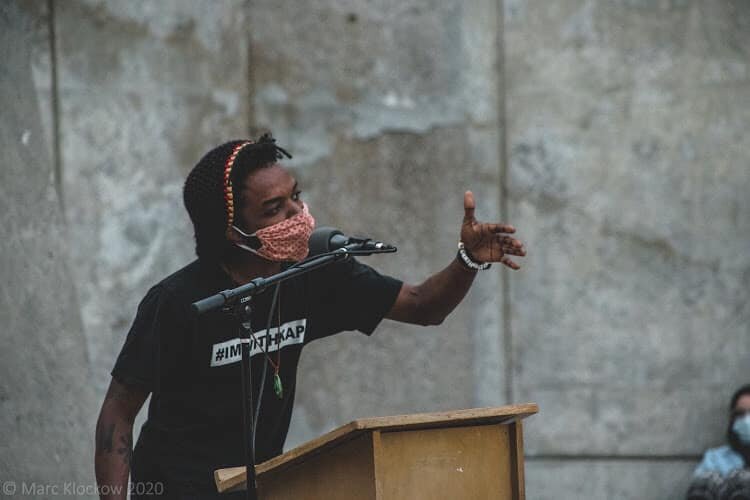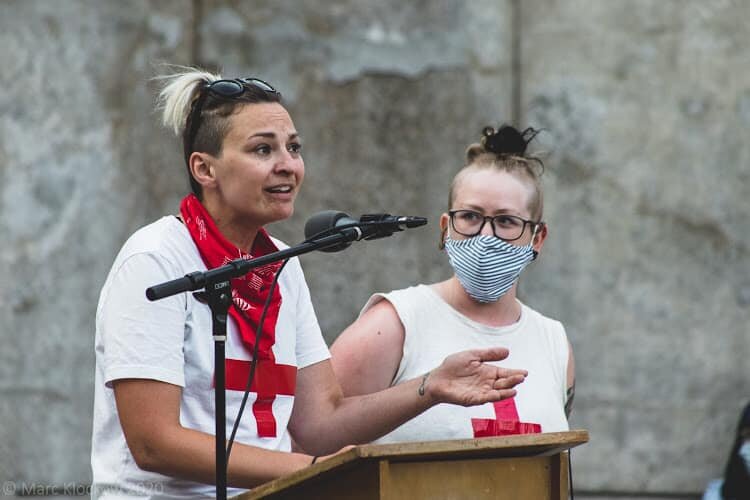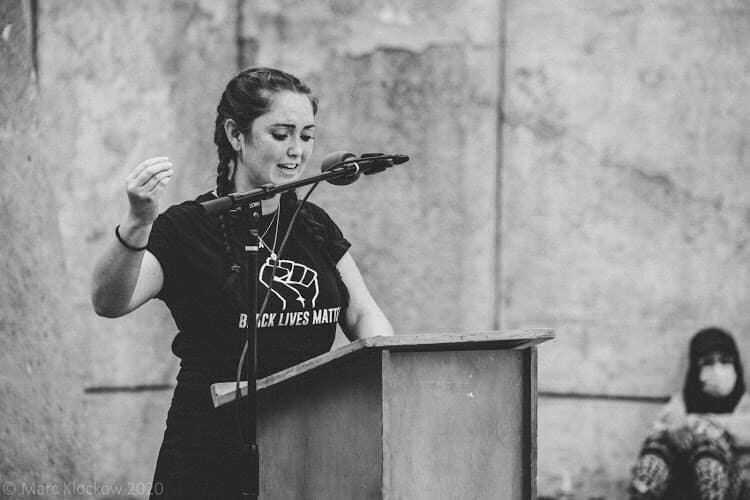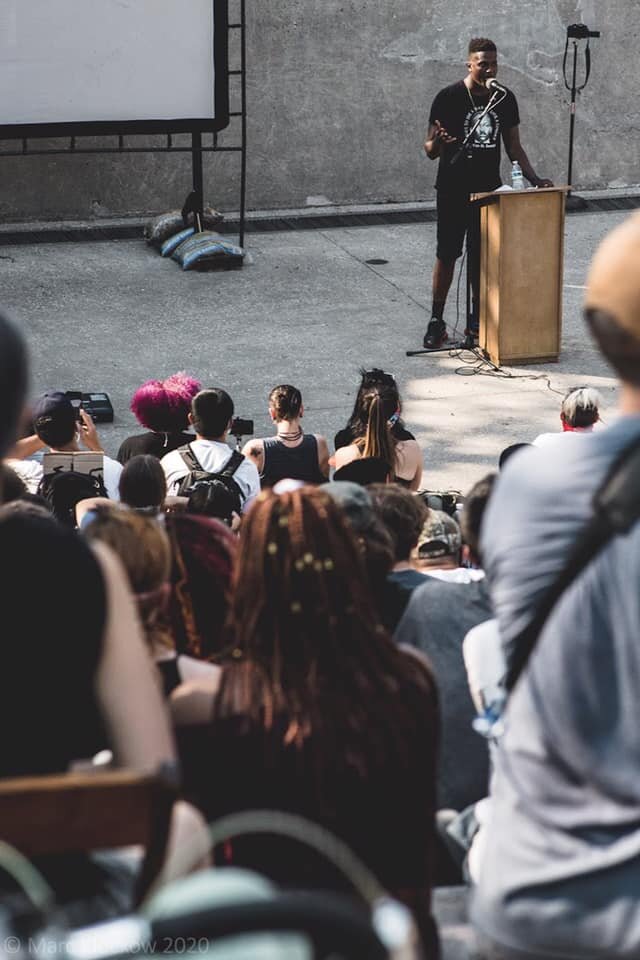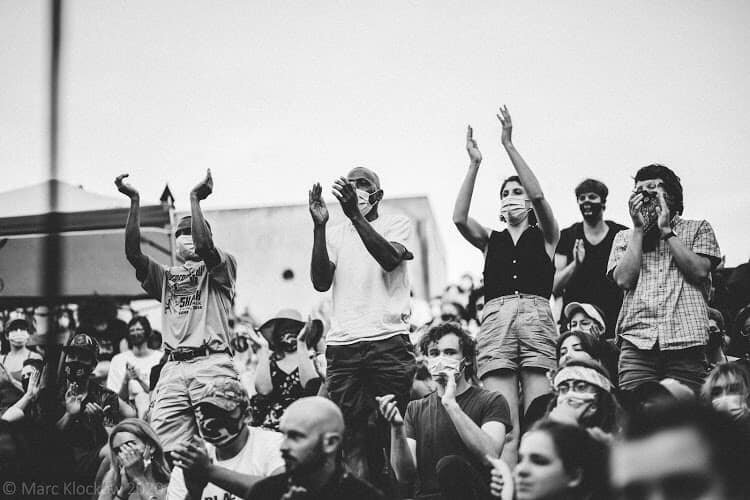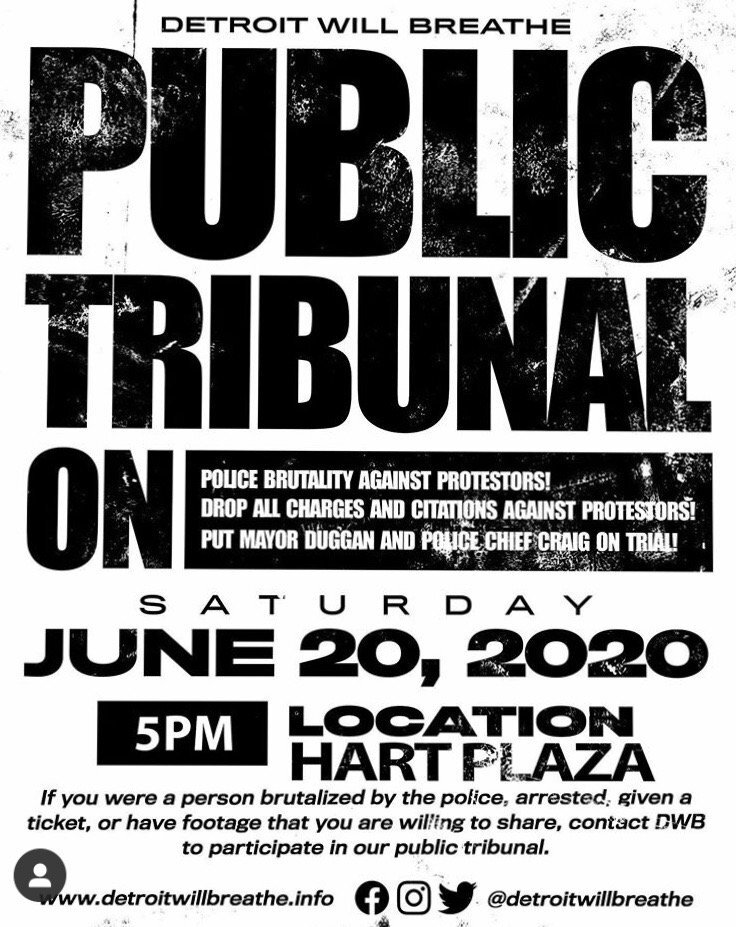People’s Tribunal — Legal Tips for Speakers
Although this document was created for protesters and organizers preparing to testify publicly at the June 20, 2020 People’s Tribunal in Detroit, these important legal tips can be helpful in many situations when talking about protests, police, etc.
PDF of this June 18, 2020 document
Some of the National Lawyers Guild attorneys and legal workers discussed what legal information may be helpful to speakers at the People's Tribunal [June 20, 2020; hosted by Detroit Will Breathe]. Thank you for your organizing work!
This information is intended as a suggestion. It is ultimately up to the activists as to how they wish to speak and represent themselves in public. Know that we will be here for everyone no matter what is said.
We hope peoples’ stories will powerfully and publicly expose the truth, challenge the official narrative, and help change the course of the current repression against activists.
All photos with this post by Marc Klockow on June 20, 2020.
We wish for the people who have been hurt and/or arrested, or witnessed the violence of the police, to be empowered to speak their truth at this event. To that end, we have some basic tips about things that can affect potential legal cases later.
While we support this forum to speak in public, we do not recommend speaking with cops or other government agents. You have NO legal obligation to speak with the police or FBI, and we strongly discourage talking to them, on the phone, at your home, anywhere. (This may seem obvious but we need to say it anyway).
First, as always, all statements made at the Tribunal can and will likely be used against the speakers in any related criminal or civil cases. Public statements in which speakers admit to illegal activity can carry great weight in legal proceedings. Furthermore, statements can be used not just at trials, but also in evidentiary rulings, plea bargaining, sentencing, depositions, and so on. Even more mundane statements that are not admissions of illegal activity, such as descriptions of other demonstrators or explanations of why the speaker took some action, can be used against the speaker and possibly other protesters. Prosecutors and lawyers for the other side will exploit statements in any way they can, regardless of whether they are made during a legal proceeding, at the Tribunal, or on social media.
Here are some suggested precautions when preparing to speak at the Tribunal:
Speak truth: If you exaggerate or say something without certainty that it is true, the legal system can ignore the important parts of what happened and focus on how you were perceived to be dishonest or inaccurate.
A common pitfall that can happen if people exaggerate is that it can undermine their credibility in court. People are often unsure about how long something went on, how many people or police were there, etc. Those specific details are not necessary, and if the numbers you say, or the time you say something started, or the length of time it lasted are not accurate, your credibility will be challenged in court. If something felt like 20 minutes, you can say "it felt so long, like 20 minutes" but don't claim how long it lasted. Same with numbers. You can say, “it looked like a wall of police,” but don’t guess like "it was at least 100 cops." People try to guess time and numbers, and it's not a safe bet.
No one wants to accidently cooperate with the state to screw over other protesters. If you name other protesters, you risk giving the opposition reason to bring legal action against them, or send cops to investigate a person you named.
Describe what a cop did; only call a cop out by name if you are sure you know their name. If you stay away from inflammatory name-calling or unrelated accusations (“he probably beats his wife”) you won’t risk facing a defamation case. The truth we know is usually bad enough.
Please don't minimize your pain or trauma. It's common for people to say "I felt a baton hit me in the arm, and you know, that hurt a little." It hurt a lot! Sarcasm or joking about pain or injuries can later be twisted by the opposition as proof that you were not hurt or injured.
It is important that the speakers are truthful. They don’t have to tell every detail, but the ones they do share should be true. Credibility is a major factor at every stage of any kind of legal proceedings. Even exaggeration could be harmful in legal proceedings. Credibility can be the deciding factor in some cases and should be maintained at all times if possible. There is even the potential that false statements could result in legal cases against a speaker.
SOCIAL MEDIA!!!
Words said on social media can and will likely be used against the speakers. So the same suggestions apply there for what you say. Because law enforcement agencies, security guards, and right-wing groups monitor social media, we strongly suggest that activists set all of their social media accounts to private, and be mindful of the potential legal implications of their posts. Understand that making posts or accounts “private” will not prevent social media companies from handing over data to law enforcement agencies. Things in your private social media accounts could still be used in court proceedings. After protesters successfully shut down Richard Spencer’s speaking event at MSU, law enforcement visited several activists based off of posts on their facebook accounts. See: www.miantirepression.org for more info.
WRITTEN STATEMENTS
You can be forced to “discover” your written statements to the other side in court proceedings, which means turning them over to the other side. Written statements (including on social media, email, paper) can be used against the writer to attack their credibility. To the extent that organizers are using written intake forms, be aware that those intake forms could become problematic for the speakers down the road. We’d be happy to consult further about strategies to avoid this, and also respect the organizers’ leadership and choices.
Moving forward, taking the following steps may be useful in protecting arrestees:
Using encrypted “zero knowledge” communications. Messaging apps such as Signal do not store user information and therefore cannot be compelled to release your private messages due to law enforcement requests, unlike popular messaging services (standard text messaging, Facebook, Gmail/Google, WhatsApp, etc). But don’t have it open on your phone! For “zero knowledge” email we would suggest you use protonmail.com (only safe if all parties are using protonmail).
Turn off the facial/thumb recognition on your phone, tablet and/or computer for the time being and use a strong password. You can test your password strength here: https://howsecureismypassword.net
Reinforcing what was stated above: be mindful of your words, both written and spoken when it will be seen publicly, sent through non-encrypted channels, or recorded (written or video), as it could and likely will be used against you by the prosecutors / opposition. (It actually is not allowed to be used to your benefit in court, only against you!)
Use the “magic words'' of legal protection (“I choose to remain silent. I want to see a lawyer.”) to empower you if police or agents of any kind call or visit you. Which they might do. No matter why they say they want to speak with you, say (and repeat as often as you want) “I choose to remain silent. I want to see a lawyer.” And NOTHING else. Build that wall of resistance.
Find more information at: https://www.nlg.org/know-your-rights/ also https://ccrjustice.org/files/CCR_If_An_Agent_Knocks.pdf
If there are any follow-up questions to this, feel free to contact us. If potential Tribunal speakers would like to talk with an attorney before Saturday’s event please email administrator@michigannlg.org.
As an FYI, the Detroit & Michigan Chapter of the NLG (which is a local chapter of a larger national organization) is part of a legal coalition which formed in response to the police riots in Detroit during the George Floyd uprising. Other coalition partners that we feel very honored to work with are the Detroit Justice Center, the National Conference of Black Lawyers, Neighborhood Defender Service, the Wayne County Criminal Defense Bar Association, and Michigan Liberation. This is a short statement about our coalition:
Since the pandemic began, we have all witnessed Michiganders exercise their right to protest and assemble. As members of Detroit’s defense community, we have come together to develop and offer coordinated legal support and representation to protectors of Black Lives. The collaborating organizations are working together to ensure that every arrested protester has a movement-oriented attorney to advocate on their behalf and that we have a coordinated defense strategy. We are committed to providing effective and accountable legal support for Black liberation struggles happening in Detroit in the wake of this uprising. Know that we are here to stand with you and represent those who are arrested for exercising their rights to speak out against the unbroken legacy of institutional racism and violence brought on by the state and law enforcement for generations.
We hope this helps. Thank you for reaching out!
In Solidarity,
Detroit & Michigan Chapter of the National Lawyers Guild

